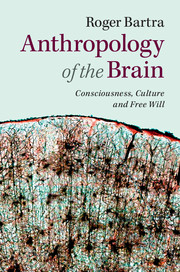Book contents
- Frontmatter
- Contents
- Preface
- Part I Consciousness and symbolic systems
- 1 The hypothesis
- 2 Evolution of the brain
- 3 Brain plasticity
- 4 Is there an internal language?
- 5 Amputations and supputations
- 6 The atrophied exocerebrum
- 7 The symbolic substitution system
- 8 Neuronal mirrors
- 9 Consciousness within hand’s reach
- 10 Outside and inside: the immense blue
- 11 The musical spheres of consciousness
- 12 Artificial memory
- 13 The lost soul
- Part II Brain and free will
- Bibliography
- Index
- References
13 - The lost soul
Published online by Cambridge University Press: 05 June 2014
- Frontmatter
- Contents
- Preface
- Part I Consciousness and symbolic systems
- 1 The hypothesis
- 2 Evolution of the brain
- 3 Brain plasticity
- 4 Is there an internal language?
- 5 Amputations and supputations
- 6 The atrophied exocerebrum
- 7 The symbolic substitution system
- 8 Neuronal mirrors
- 9 Consciousness within hand’s reach
- 10 Outside and inside: the immense blue
- 11 The musical spheres of consciousness
- 12 Artificial memory
- 13 The lost soul
- Part II Brain and free will
- Bibliography
- Index
- References
Summary
Very many people, especially if they have religious inclinations, resist the belief that their affections and feelings are merely a property of the nervous system. They have difficulty accepting that consciousness is a biological peculiarity of the brain, the same way that digestion is a biological characteristic of the digestive tract, to use the expression of the philosopher John Searle. It is difficult for even non-religious people to accept that consciousness is the whole of organic processes belonging to a perishable encephalic mass. Of course, one of the main quandaries lies in the fact that the affirmation that consciousness does not exist outside of the brain is equivalent to accepting that there is nothing after death.
It should be recognized that people are right when they intuit that biological processes, alone, do not explain consciousness. However, looking to the religious belief in an immortal soul to explain consciousness does not solve the problem, but rather is an escape from it. Perhaps it placates the melancholy that is born from the thought that identity that is lived in the present, lacks a future once life is lost. But the intuition that there must be processes or dimensions outside of the brain that help explain the phenomenon of consciousness should not be discarded as a metaphysical vision lacking scientific rigor, as I explain throughout this book. I have searched for exocerebral resources in the cultural and social world that aid in understanding the problem of consciousness. Now I would like to refer to a proposal that, without being religious, defends the idea that there is an immaterial world of mental states, conscious and unconscious, which Plato would have defined as “affects of the soul,” between the physical and sociocultural world. This is the interpretation defended by the philosopher Karl Popper and the neurobiologist John Eccles in a book that was very much discussed some years ago and that still arouses interest.
- Type
- Chapter
- Information
- Anthropology of the BrainConsciousness, Culture, and Free Will, pp. 106 - 110Publisher: Cambridge University PressPrint publication year: 2014



